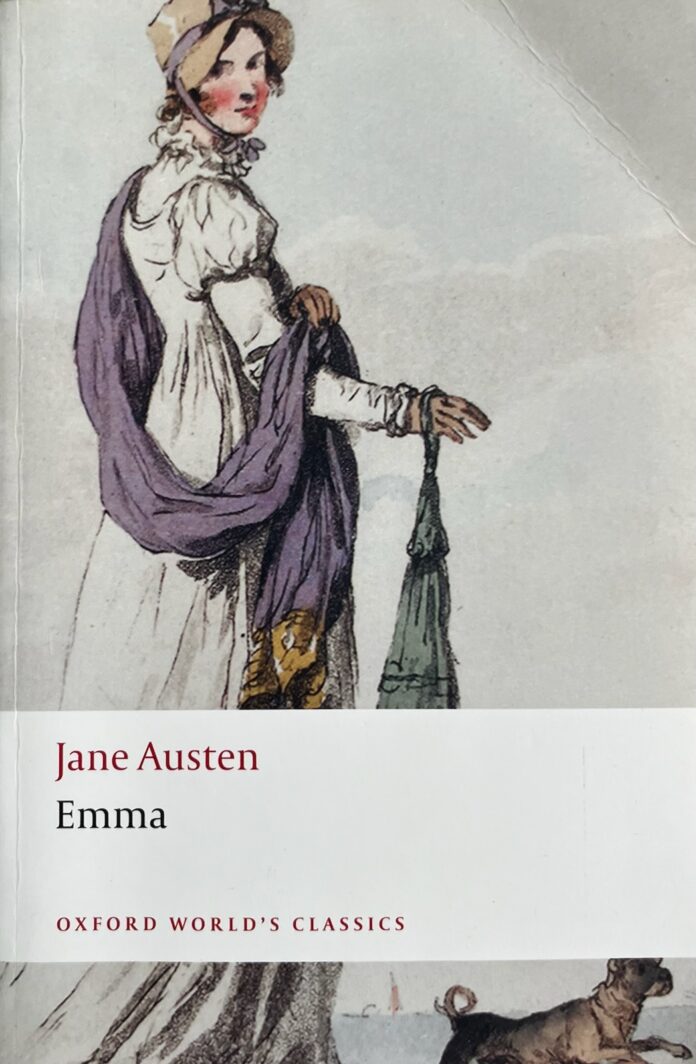
Acclaimed by scholars as her finest novel, Jane Austen’s “Emma” is a compelling and humorous tale about misunderstandings, clandestine romance and the errs of hubris. Austen’s longest novel, “Emma” creates a name for itself through its colorful characters, whimsical plot and arguably unlikable heroine. Regardless of the latter point (perhaps even because of it), “Emma” is easily my personal favorite Austen work and one of my favorite pieces of literature in general.
“Emma,” as is every Jane Austen novel, is set in Regency era England and focuses mainly on the lives of the gentry – the landowning class. The novel’s focus is primarily Emma Woodhouse – the beautiful, clever, wealthy heiress of one and twenty (i.e. 21 years old) who unintentionally and humorously wreaks havoc on her neighbors in the lush village of Highbury.
The opening page reveals that Emma enjoys an easy, enviable life with her doting father at their natural yet immodest estate of Hartfield. Nevertheless, this serenity is narratively interrupted after the successful pairing of Emma’s former governess and a decently established, widely-loved tradesman awakens a dangerous affinity for match-making within the heroine.
Emma’s ridiculousness drives the narrative of the plot. As a result of her comical naivety, the litany of her inept social observations grows long. Moreover, Emma’s inability to acknowledge her want of intuition aggregates with her pestering elitism to form a heroine that is both slapstick and frustrating (especially to 21st-century Americans).
It is therefore unsurprising that the novel’s unfavorable reception among fans is often attributed to Emma herself. In fact, in referring to Emma, Austen even notoriously said, “I am going to take a heroine whom no one but myself will much like.”
In Volume I, Emma’s schemes cause trouble for her friend Harriet Smith – a gorgeous orphan of illegitimate birth that Emma is determined to “rescue.” Erroneously believing the handsome Highbury vicar, Mr. Elton, to be in love with Miss Smith, Emma dutifully orchestrates the couple’s “love story.”
Fanning Harriet’s previous indifference towards Mr. Elton to a flame of passionate infatuation, Emma plots the couple’s dates. Moreover, when Robert Martin addresses a letter of proposal to Miss Smith, Emma has it declined – repulsed by Mr. Martin’s status as a farmer.
Mr. Elton’s unwilting enthusiasm about his and Harriet’s “dates” is promising, until it is finally revealed that he fancies Emma – not Harriet. Harriet receives the news poorly, which Emma genuinely feels guilt over. Though, in characteristic snobbiness, Emma sits in ire over Mr. Elton’s audacity to approach her.
Thus, Emma’s flaws are promptly revealed to the reader within the first volume. Contrary to modern perceptions of a good heroine, Emma is privileged, ignorant, close-minded, classist and selfish. I understand that this may be jarring to a number of readers, but, for me, Emma’s imperfections do not obscure my love for this Austen novel.
In fact, the character Emma is one reason why I adore the novel. In candor, my perception of Emma as a loveable heroine likely stems from our similarities. Emma and I are the same age, but, more intimately, I feel represented by her beauty, intelligence and (*gasp*) snobbiness.
Moreover, her personality is not without nuance, which makes Emma compelling. Sure, we watch her persuade Harriet Smith out of accepting “lowly” Robert Martin’s proposal, but she also weeps after she cruelly offends Ms. Bates – a scene that brought me to tears. Emma’s character ultimately can not be fully captured by dichotomous ideas about morality. In peak relatability, Emma is a character that possesses both virtue and vice.
In holding another controversial opinion, I believe the love story between Frank Churchill and Jane Fairfax to be the hidden gem in “Emma.” Miss Fairfax – the poor, orphaned niece of Ms. Bates – pays a long visit to her aunt and grandmother in Volume II. In poor health and fearful of her fateful occupation as a governess, she chooses Highbury over a vacation in Ireland with her adoptive family.
Frank Churchill, who the reader ultimately learns is her secret fiancé, is a wealthy heir to his aunt and uncle’s fortune. Not long after Miss Fairfax arrives in Highbury, Frank finally pays a visit to Mr. Weston – his beloved father who recently married Emma’s former governess.
While Volume II and III are full of Emma, unsurprisingly, wreaking havoc on the secret couple, Austen provides endearing hints of the couple’s love. Especially noticeable upon a second read, Frank dotes upon Jane – finding excuses to visit the Bates’ and becoming offended by Mrs. Elton’s derogatory treatment of her. He is also later revealed to be the anonymous gifter of Jane’s pianoforte.
The beautiful couple ultimately lives happily ever after when the death of Frank’s aunt allows him to marry Jane without endangering his inheritance. An ending that perfectly wraps up such a fun tale.